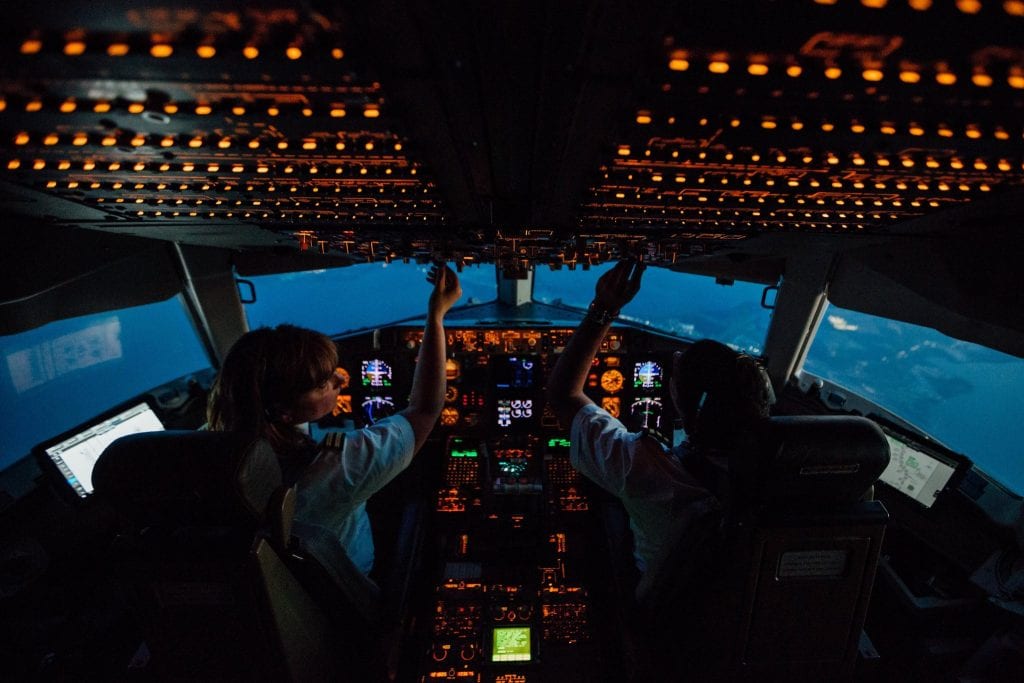Skift Take
Delta Air Lines is getting public relations blowback by not mandating its employees be vaccinated. Delta points to its voluntary vaccination program as a success, but the Atlanta-based carrier said it will fall into line when the federal government requires contractors to vaccinate crews.
As more major U.S. airlines jumped on the bandwagon this week to require vaccines for its workers or be terminated, Delta Air Lines stood out as the last major holdout. But the clock could be ticking for Delta to comply with federal regulations.
The Atlanta-based carrier says it is not inclined to force its employees to get their shots, given the trajectory of its voluntary vaccination program. As of Monday, 84 percent of its employees have been vaccinated, and Delta is on track to have 90 percent of its employees vaccinated by Nov. 1, the company said. After that date, Delta will levy a $200 per month surcharge on unvaccinated employees’ health insurance and require those employees to be tested weekly and to wear masks at work.
Still, by not joining its peers with a mandatory requirement, Delta could face backlash on the public relations front. Delta, however, doesn’t see it that way.
“I’m really pleased with the success we are having at Delta on the vaccine,” CEO Ed Bastian said at the the International Air Transport Association’s Annual General Meeting in Boston this week. “We are up to 84 percent vaccinated, a 10 point increase in just the last four weeks.”
Southwest Airlines, JetBlue, and Alaska Airlines on Friday joined United Airlines and Frontier Airlines in requiring all employees be vaccinated against Covid-19. United took an early and tough stance — and scored a public-relations victory — by not allowing religious or medical exemptions. More than 200 United employees lost their jobs last week for not complying with the company’s mandate.
Most U.S. airlines are part of the Civil Reserve Air Fleet, which allows the Defense Department to requisition aircraft for military purposes, most recently to evacuate refugees from Kabul, Afghanistan in August. In addition, most airlines have cargo contracts with the Defense Department. This makes them federal contractors, subject to, they argue, President Joseph R. Biden Jr.’s executive order mandating vaccines for federal employees and contractors.
“American is classified as a government contractor,” American Airlines CEO Doug Parker and President Robert Isom wrote in a letter to employees last week after unions objected to employer mandates. “As a result, the federal vaccine mandate requires that all of American’s U.S.-based team members and certain international crew members be vaccinated, without the provision of a regular testing alternative.”
Airlines have until Dec. 8 to comply with the executive order.
Delta said it has not yet made a decision. “We are talking to the White House and the administration on what the requirements are,” Bastian said. “I’m not sure how far you need to go to be in compliance with the [executive order], but we will certainly follow what our requirements will be,” he added, referring to the percentage of employees that must be vaccinated.
Union Reaction
Delta is among the least-unionized airlines in the country, which makes its vaccination program easier to implement. Southwest and American faced revolts from their pilots unions, which argued that pilots should be exempted from vaccine requirements. After American’s management made the argument that the carrier’s employees are federal contractors, Southwest and Alaska quickly followed.
The national Air Line Pilots Association (ALPA) has thrown its support behind vaccines, but also said vaccine mandates should be bargained for other benefits. And even at United, pilots are said to be negotiating new long-term disability benefits. “As a union, ALPA will continue defending and protecting the rights of pilots –– as it always has – and bargain over the implementation of employer mandated vaccinees where appropriate,” ALPA President Joe DePete said in a statement.
“Rather than acting as an obstacle, unions can help implement vaccine mandates because they can identify and resolve worker concerns about these programs through the bargaining process,” Association of Flight Attendants President Sara Nelson wrote in a memo.
Delta’s pilots are organized, but few of its other workgroups are, so it faces no such backlash or threat of bargaining, making its stance easier to mandate. Nelson said of Delta’s insurance surcharge: “This punitive approach would never happen with a union contract. And by implementing it, Delta perpetuates the lie that public safety is a personal choice — if you can afford it, that is.”
“Delta’s own approach to encourage a high rate of employee vaccinations continues to work, with an 84 percent workforce vaccination rate and climbing daily.” a spokeswoman for the carrier said.
“At Delta Air Lines, our approach to this has been a marathon, and we realize that this is not a rush to any finish line – that this is a long game,” Delta Chief Health Officer Dr. Henry Ting wrote in a memo to employees.
A Uniquely American Issue
Although pockets of vaccine resistance exist all over the world, the airline industry controversy is almost completely unique to the U.S. In many other countries, employers cannot mandate public-health measures, like vaccines. This is the exclusive purview of government. Instead, they will restrict where their crews can fly based on vaccine requirements at the destinations, as KLM is doing, until their home governments mandate the vaccines.
Skift Airlines Reporter Edward Russell contributed to this story.
The Daily Newsletter
Our daily coverage of the global travel industry. Written by editors and analysts from across Skift’s brands.
Have a confidential tip for Skift? Get in touch
Tags: alaska airlines, american airlines, delta air lines, southwest airlines, united airlines
